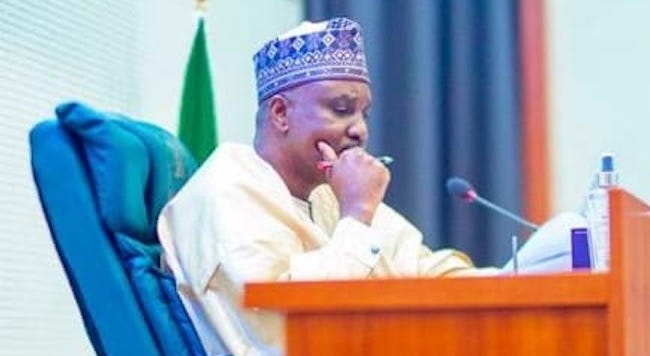

Nigerias spiraling debt profile has crossed a dangerous line, with Speaker of the House of Representatives, Rep. Abbas Tajudeen, sounding a dire warning that the nation is on the brink of mortgaging its future through reckless borrowing and weak oversight.
Speaking at the opening of the 11th Annual Conference and General Assembly of the West Africa Association of Public Accounts Committees (WAAPAC) in Abuja, Abbas revealed that Nigerias public debt ballooned to 149.39 trillion (about US$97 billion) in the first quarter of 2025a staggering jump from 121.7 trillion the previous year.
Even more concerning is the debt-to-GDP ratio, which now stands at roughly 52 per cent, well above the statutory ceiling of 40 per cent set by our own laws. This breach of our debt limit signals the strain on fiscal sustainability, Abbas declared.
The Speaker warned that Nigerias fiscal recklessness is not just a budgetary challenge but a generational betrayal. Oversight of public debt is a democratic duty and a moral responsibility of the legislature, he stressed. Our parliaments must ensure that every borrowing decision reflects prudence, transparency, and the collective interest of our citizens.
Abbas painted a grim picture of the continents debt trap, recalling that Africas total public debt hit $1.8 trillion by 2022, with external debt alone projected to surpass $1 trillion by 2023. He cited countries already drowning in debt, such as Sudan at 344 percent debt-to-GDP, Angola at 136.8 percent, Ghana at 84 percent, Kenya at nearly 70 percent, and South Africa above 77 percent.
Read also:Tinubu dismisses special assistant on digital and creative economy, Fegho Umunubo
For Nigeria, the Speaker warned, the red flags are already flying. In many cases, governments are spending more on servicing debt than on healthcare and other essential services, he lamented. This is not just a budgetary concern, but a structural crisis that demands urgent parliamentary attention and coordinated reform.

He revealed that domestic borrowing makes up 53 percent of Nigerias debt while external borrowing accounts for 47 percent, a balance that leaves the country dangerously exposed to shocks from volatile foreign markets.
The Speaker was unsparing in his criticism of Africas borrowing patterns. He noted that Western private lenders now control 35 percent of Africas government debt, with multilateral institutions like the World Bank and IMF holding another 39 percent, while Chinese creditorsoften scapegoated in public debatesaccount for just 12 percent.
A significant share of our national revenues is tied to debt servicing rather than being invested in the things our people need most: roads, schools, hospitals, and innovation, Abbas said. The high cost of commercial loans, coupled with the burden of repayment in foreign currencies, leaves many African economies vulnerable to market shocks.
He urged a complete rethink of borrowing habits: If Africa is to grow stronger, we must not only negotiate fairer terms of borrowing but also rethink our dependence on external finance. We must channel more energy into mobilising domestic resources, fostering intra-African trade, and creating financial instruments that serve the continents own development priorities.
While Abbas raised the alarm, government officials attempted to downplay the crisis. Finance Minister Wale Edun insisted Nigeria is turning the corner, claiming that economic reforms are expanding fiscal space and investor confidence. He argued that the debt-to-GDP ratio stands at 38.8 percent, describing it as a comfortable level compared to global benchmarks.
But the Speakers message was blunt: without drastic reforms and strict oversight, Nigeria risks sliding into a debt trap that could cripple its economy and sacrifice the wellbeing of future generations. Citizens have the right to know, and we have the duty to inform, Abbas declared.

Comments
This site uses User Verification plugin to reduce spam. See how your comment data is processed.